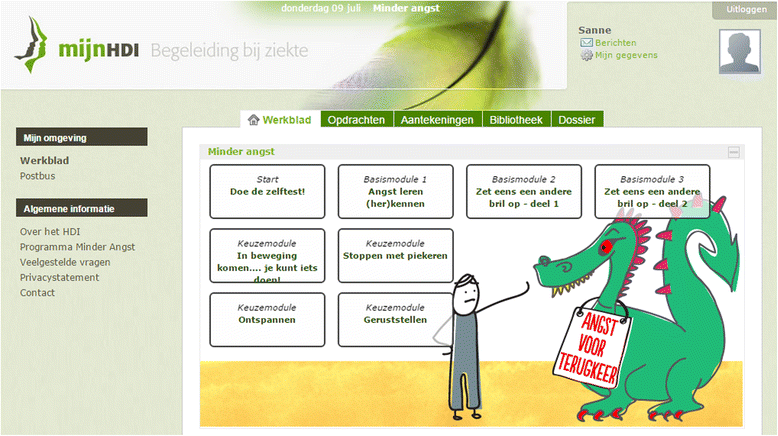Study protocol of the CAREST-trial: a randomised controlled trial on the (cost-) effectiveness of a CBT-based online self-help training for fear of cancer recurrence in women with curatively treated breast cancer
- PMID: 27455846
- PMCID: PMC4960756
- DOI: 10.1186/s12885-016-2562-0
Study protocol of the CAREST-trial: a randomised controlled trial on the (cost-) effectiveness of a CBT-based online self-help training for fear of cancer recurrence in women with curatively treated breast cancer
Abstract
Background: One of the most prevalent long-term consequences of surviving breast cancer is fear of cancer recurrence (FCR), which is associated with higher (mental) healthcare costs and lower surveillance rates. The majority of breast cancer survivors report a need for professional help in dealing with FCR. An easy-accessible and cost-effective evidence-based psychological intervention for reducing FCR is lacking. In the current study an online self-help training to reduce FCR will be evaluated. In addition, the secondary aim of this study is to identify factors that predict whether women can benefit from the online self-help training or not.
Methods/design: A multi-centre, parallel-groups, randomised controlled trial will be conducted to evaluate the (cost-) effectiveness of the CAREST-trial. A sample of 454 women with curatively treated breast cancer will be recruited from 8 hospitals in the Netherlands. Participants will be randomised to the intervention or usual care group (1:1). Self-report measures will be completed at baseline, 3 (post-intervention), 9, and 24 months. Primary outcome is FCR severity; secondary outcomes are healthcare costs, health status, and psychological distress. The online tailored self-help training "Less fear after cancer" is based on cognitive behavioural therapy and consists of 2 basic modules (psycho-education; basic principles of cognitive behavioural therapy) and 4 optional modules (rumination; action; relaxation; reassurance) to choose from. Each module consists of an informative part (texts, videos, audio files) and a practical part (exercises). For every patient, the intervention will be available for three months. Personal online support by an e-mail coach is available.
Discussion: Online self-help training may be an easy-accessible and cost-effective treatment to reduce the impact of FCR at an early stage in a large group of breast cancer survivors. A strength is the 24 months follow-up period in the health economic evaluation. The results of the study will provide information on the possible strengths and benefits of online self-help training for FCR in breast cancer survivors.
Trial registration: This study is registered at the Netherlands Trial Register ( NTR4119 , date registered: August 15, 2013).
Keywords: Breast cancer; CBT; Cost-effectiveness; Fear of cancer recurrence; Online; RCT; Self-help.
Figures
Similar articles
-
CBT-based Online Self-help Training to Reduce Fear and Distress After Cancer (CAREST Randomized Trial): 24 Months Follow-up Using Latent Growth Models and Latent Class Analysis.Ann Behav Med. 2023 Aug 21;57(9):787-799. doi: 10.1093/abm/kaac078. Ann Behav Med. 2023. PMID: 37078920 Free PMC article. Clinical Trial.
-
No effect of CBT-based online self-help training to reduce fear of cancer recurrence: First results of the CAREST multicenter randomized controlled trial.Psychooncology. 2020 Jan;29(1):86-97. doi: 10.1002/pon.5233. Epub 2019 Nov 13. Psychooncology. 2020. PMID: 31595627 Clinical Trial.
-
Protocol of a randomized controlled trial of the fear of recurrence therapy (FORT) intervention for women with breast or gynecological cancer.BMC Cancer. 2016 Apr 25;16:291. doi: 10.1186/s12885-016-2326-x. BMC Cancer. 2016. PMID: 27112319 Free PMC article. Clinical Trial.
-
Web-based interventions for fear of cancer recurrence: A scoping review with a focus on suggestions for the development and evaluation of future interventions.PLoS One. 2024 Nov 8;19(11):e0312769. doi: 10.1371/journal.pone.0312769. eCollection 2024. PLoS One. 2024. PMID: 39514597 Free PMC article.
-
Cognitive behavioral therapy for reducing fear of cancer recurrence (FCR) among breast cancer survivors: a systematic review of the literature.BMC Cancer. 2022 Feb 28;22(1):217. doi: 10.1186/s12885-021-08909-y. BMC Cancer. 2022. PMID: 35227244 Free PMC article.
Cited by
-
A systematic review on eHealth technology personalization approaches.iScience. 2024 Aug 19;27(9):110771. doi: 10.1016/j.isci.2024.110771. eCollection 2024 Sep 20. iScience. 2024. PMID: 39290843 Free PMC article.
-
Predictors of participation in online self-management programs: A longitudinal observational study.Rehabil Psychol. 2024 May;69(2):102-109. doi: 10.1037/rep0000521. Epub 2023 Nov 13. Rehabil Psychol. 2024. PMID: 37956087 Free PMC article.
-
Long-term efficacy and cost-effectiveness of blended cognitive behavior therapy for high fear of recurrence in breast, prostate and colorectal Cancer survivors: follow-up of the SWORD randomized controlled trial.BMC Cancer. 2019 May 16;19(1):462. doi: 10.1186/s12885-019-5615-3. BMC Cancer. 2019. PMID: 31096934 Free PMC article. Clinical Trial.
-
Cancer worry is associated with increased use of supportive health care-results from the multinational InCHARGE study.J Cancer Surviv. 2024 Feb;18(1):165-175. doi: 10.1007/s11764-023-01337-w. Epub 2023 Jan 27. J Cancer Surviv. 2024. PMID: 36705796
-
eHealth Interventions for Dutch Cancer Care: Systematic Review Using the Triple Aim Lens.JMIR Cancer. 2022 Jun 14;8(2):e37093. doi: 10.2196/37093. JMIR Cancer. 2022. PMID: 35699991 Free PMC article. Review.
References
-
- Dutch Cancer Society . Cancer in the Netherlands until 2020. Amsterdam: Dutch Cancer Society; 2011.
-
- Koch L, Bertram H, Eberle A, Holleczek B, Schmid-Höpfner S, Waldmann A, Zeissig SR, Brenner H, Arndt V. Fear of recurrence in long-term breast cancer survivors - still an issue. Results on prevalence, determinants, and the association with quality of life and depression from the Cancer Survivorship - A multi-regional population-based study. Psycho Oncol. 2014;23:547–54. doi: 10.1002/pon.3452. - DOI - PubMed
-
- Thewes B, Butow P, Bell ML, Beith J, Stuart-Harris R, Grossi M, Capp A, Dalley D. Fear of cancer recurrence in young women with a history of early-stage breast cancer: a cross-sectional study of prevalence and association with health behaviours. Support Care Cancer. 2012;20:2651–9. doi: 10.1007/s00520-011-1371-x. - DOI - PubMed
Publication types
MeSH terms
LinkOut - more resources
Full Text Sources
Other Literature Sources
Medical


